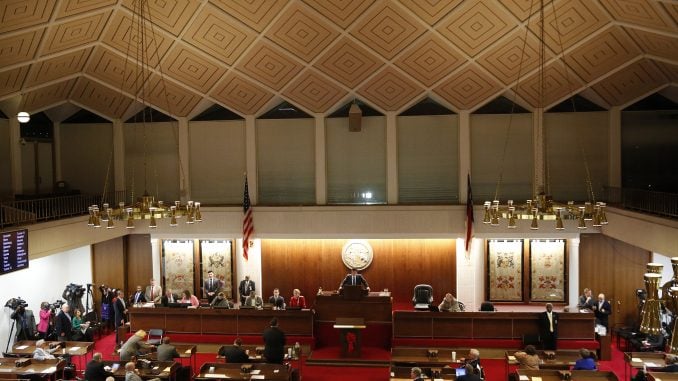
RALEIGH — Republicans in the General Assembly managed to gain a supermajority in the Senate but came up one seat short in the House.
In the Senate, Republicans picked up two seats and now control 30 of the 50 senate seats.
“Tonight the voters of North Carolina spoke loud and clear. They returned a Republican supermajority to the state Senate,” Senate Leader Phil Berger (R-Eden) said in a statement on Nov. 8. “I want to thank the voters for their trust and support over the past seven elections.”
Berger went on to say the election “has been a barometer for where voters want their state and country to go” and that the Republican platform of low taxes, job creation, expanded parental choice, and quality education, is one that reflects the needs of all North Carolinians.
He also congratulated House Speaker Tim Moore (R-Kings Mountain) for successes in the House and said he is “hopeful that Senate Democrats will respect the verdict of North Carolina’s voters evident in tonight’s results.”
On the House side, Republicans gained two seats, bringing their total to 71 seats out of 120. The pickups came in just shy of the needed 72 (60%) for a supermajority.
“We have a handful of Democrats who work with us,” Moore said in a joint press conference the day after the election. “We have some new members coming in, and I feel completely confident that should we need to override vetoes, we’ll be able to do our part in the House as well.”
Republican State Leadership Committee President Dee Duncan sent congratulations to both chambers and said the election results “are a strong rebuke of the national liberal agenda and a critical victory for North Carolinians” and that “For the last six years, North Carolina thrived despite Gov. Cooper, not because of him.”
Gov. Roy Cooper’s message on election night claimed the Republicans being one seat shy was due to citizens voting for “balance and progress.”
“We stopped a GOP supermajority tonight when North Carolinians voted for balance and progress. I’ll continue to work with this legislature to support a growing economy, more clean energy, better health care and strong public schools,” tweeted Cooper.
North Carolina Democratic Party Chair Bobbie Richardson also released a statement on “protecting Gov. Cooper’s veto power” that read in part, “voters have rejected the attempts of North Carolina Republicans to consolidate power and take our state backwards. North Carolinians see a stronger future for our state when Democrats have a seat at the decision-making table.”
The lack of a supermajority in the House means Cooper will likely be able to continue his pattern of liberal veto use. He has vetoed 75 bills in the last six years whereas a combined 35 were issued by the five past governors who had veto power, 68% of all vetoes since the state’s governor has had the power to do so.
Cooper vetoed 28 bills in just his first two years in office. During that time Republicans held supermajorities that led to 23 overrides. In 2018, Democrats broke Republican supermajorities in both chambers. Since then, Democrats have upheld the governor’s vetoes on the few occasions when an override vote has been called.
Key House races of note include Rep. Erin Paré retaining her seat as the lone Republican in Wake County. She defeated Democrat Christine Kelly by over 8 percentage points.
A comparable situation unfolded in Mecklenburg County with John Bradford beating Democrat Christy Clark for the District 98 seat.
Other hard-fought wins for Republicans following redistricting included the two Guilford County seats held by Jon Hardister and John Faircloth, as well as the Forsyth County seat of Jeff Zenger.
Democrats Brian Farkas (Pitt), Howard Hunter III (Hertford County), James Gailliard (Nash County), Terry Garrison (Vance County), and Linda Cooper-Suggs (Wilson), all saw their seats flip to Republican control. One Republican, Larry Yarborough (Granville), lost his race to Democrat Ray Jeffers.
In Alamance County, Republican Stephen Ross took back the seat from Rep. Ricky Hurtado. Ross previously represented the region for eight years in the House before Hurtado unseated him in 2020.
The House tally could shift by one with House District 73 (Cabarrus County) candidate Republican Brian Echevarria stating he is not conceding his race just yet.
While we wait for final ballots to be certified, I am not conceding,” Echevarria wrote In a Nov. 10 Facebook post. “There are still a number of ballots that need to be counted before results are certified, and until the Cabarrus County Board of Elections completes its canvass, we will not give up in our efforts to ensure every legally cast ballot is counted.”
His opponent, Democrat Diamond Staton-Williams, leads by 425 votes or 1.56%. While Echevarria won the election day vote, Staton-Williams led in early voting and Absentee By-Mail ballots.
In order for a recount to be triggered, the margin separating two candidates needs to be less than one percent.
Cabarrus County election officials still have some Absentee By-Mail ballots and 660 provisional ballots yet left to count. Mailed ballots postmarked on or before Election Day will still be accepted through Nov. 14. The results will be unofficial until the N.C. State Board of Elections completes its canvas on Nov. 18.

